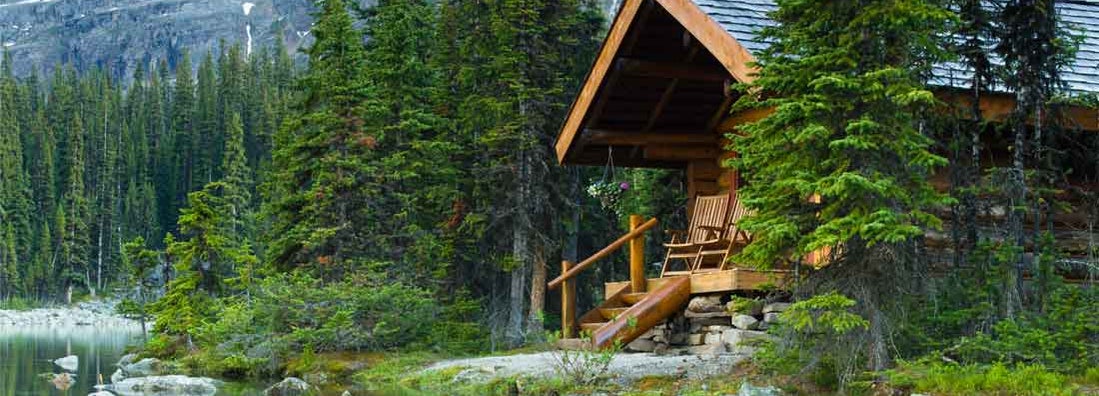Land Insurance
(Finding the right coverage has never been easier)

Jeff Green has held a variety of sales and management roles at life insurance companies, Wall street firms, and distribution organizations over his 40-year career. He was previously Finra 7,24,66 registered and held life insurance licenses in multiple states. He is a graduate of Stony Brook University.

You may be leaving your parcel of land undeveloped for a number of reasons. Maybe one day you plan on building a summer cabin or retirement retreat, or maybe you use the land to hunt and fish. No matter what your vacant land is used for, you might want to consider insuring it against certain risks.
If you need land insurance and aren’t sure where to start, contact a local independent insurance agent in our network. Your agent can help you compare quotes from multiple insurance companies and gather the information you need to make an informed decision about land insurance.
The Basics of Vacant Land Insurance
- If you own your property outright, you are not required by law to buy land insurance; however, in the event of a lawsuit this coverage will be essential
- If your property is financed, your lender may require land insurance
- Vacant land cannot have any existing structures
- Hunting land insurance is important if your land is used for sport
What Is Land Insurance?
Land insurance is a form of property coverage that will cover a claim of bodily injury or property damage if someone has an accident on your property and you are found to be at fault. If someone files a lawsuit against you, it will also help to cover your legal fees.
While it cannot cover any damage that happens to your land, it will protect you financially if others are ever on your property. To decide whether this type of insurance is important for you, consider your risks and talk with a knowledgeable agent.
The easiest way to add land insurance is through your homeowner’s policy. If you own a home, you can typically extend your liability coverage to include your vacant land. If you have an umbrella liability policy, be sure to add your vacant land to that policy as well, and update your liability if needed.
If you don’t have a homeowner’s policy, you can purchase a separate vacant land insurance policy through an independent insurer. There is typically no deductible on these policies and the premiums are affordable. Plus, you’ll have the peace of mind that no matter what happens on your land, your assets are covered.
Hunting Land Insurance
If you plan on using your property for hunting and allow others use it as well, it’s very important to purchase property insurance. Because of the risks involved in hunting and use of firearms, you have a greater risk for liability concerns.
As a responsible landowner, you should inform all hunters of any perils they should know about that may exist on your property, such as cliffs, abandoned wells, or barbed wire fences.
Sharing this knowledge is one important way to help cover your liability risks, but it is still important to have liability insurance coverage in place as well.
Some insurance companies require landowners to make hunters sign a waiver absolving the landowner of any wrongdoing. While this won’t protect you from all potential lawsuits, it can provide a safety net that otherwise wouldn’t exist.
Some hunters may ask to use all-terrain vehicles on your property, and it is important to realize that you will assume additional liability risks if you allow it.
If an accident happens on your property, you can potentially be held responsible – especially if there are features in the natural landscape that pose a risk.
What Vacant Land Insurance Does Not Cover
If you have any kind of structure on your land, even if it is temporary, your land is no longer "vacant" and will not be covered by vacant land insurance. If you decide to start constructing a building on your formerly vacant land, the land insurance will be void for that structure.
You will need to purchase additional property insurance to cover any outbuildings or dwellings. Even you have an old dilapidated structure on your property that has been empty for many years, your land is not considered vacant property.
And if someone is injured inside an abandoned building on your property, your land insurance liability will not cover it. Ask your insurance agent how to protect yourself against claims that are related to abandoned buildings.
How to Purchase a Land Insurance Policy
If your insurance company doesn’t offer additional liability coverage, you may need to seek out a company that carries specialized coverage. Our independent insurance agents can typically find specialty insurance because of their association with many insurance companies.
While one carrier may be able to cover your risks at an affordable rate, another may not be able to offer land insurance at all, so working with an agent that can review various insurer's products can save you time.
If you need liability coverage for your land, an independent agent is a great resource. Find a local insurance agent in your area today to compare quotes and get the land insurance coverage that you need.
